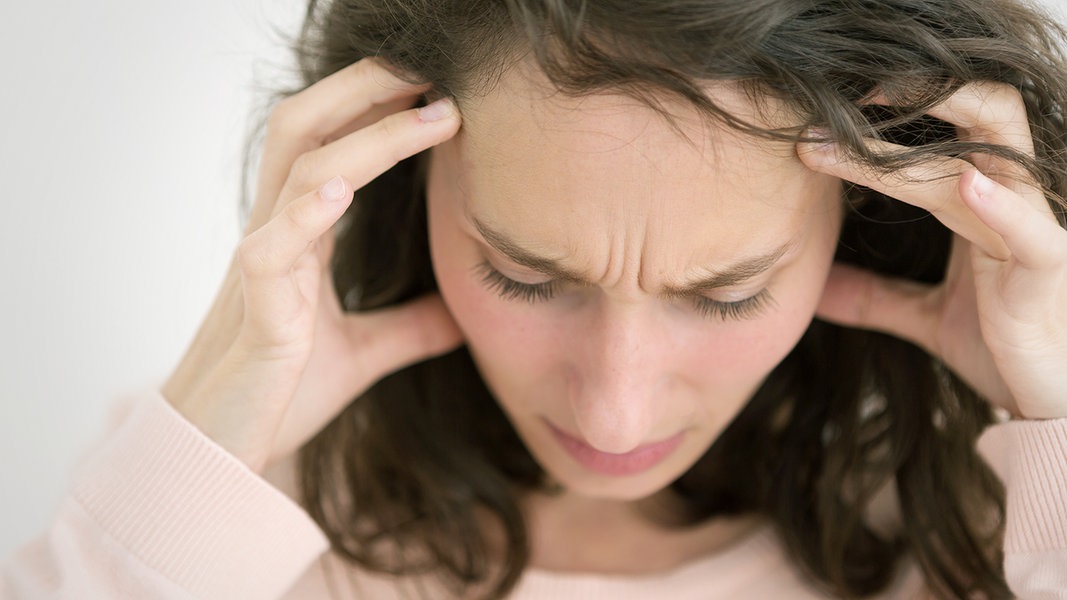Status: 04/03/2023 12:49 p.m
Physical symptoms such as pain cannot always be traced back to a clear cause. Then it is often said that the psyche is to blame. A case for psychosomatics?
Persistent symptoms such as pain, dizziness or indigestion are very stressful for those affected. Even more so when physical examinations, blood tests and imaging procedures do not find a clear cause. The suspected diagnosis of a somatoform disorder is then often made. The term from psychosomatic medicine, often also referred to as psychosomatics, stands for physical complaints that are not or not solely due to an organic disease and for which a mental cause is assumed.
In fact, stress, grief or unresolved conflicts can manifest themselves physically and lead to dizziness, pain, tachycardia or digestive disorders. The mind and body are closely related and influence each other. The idea that diseases are either purely physical or purely psychological is now considered outdated.
Today it is assumed that there are only mixtures of both, with different weighting. This means that physical symptoms and psychological ones are mutually dependent and reinforce each other. For example, anxiety can lead to tachycardia and shortness of breath – and chronic physical ailments can trigger depression. Therefore, from the point of view of those affected, it makes no sense to treat only one or only the other. In the case of unclear symptoms, a holistic, psychosomatic view is therefore important.
Common psychosomatic symptoms
The following symptoms are often caused or exacerbated by mental stress (e.g. fear, stress, grief):
The symptoms can be mild and disappear after a short time, but they can also be chronic. In many cases, psychosomatic symptoms are accompanied by great fears of suffering from a threatening illness.
Diagnosis “psychic cause” must be clarified
One problem: Many sufferers experience the suspected diagnosis of a somatic stress disorder as stigmatizing. This is partly due to the widespread but long outdated idea that mental health problems are “just imagined” or less serious. As a result, people with unclear symptoms often worry that the doctor will not take them seriously and that they will be pigeonholed as “mental causes”.
In fact, experts criticize the fact that the diagnosis “somatic stress disorder” is sometimes made prematurely in everyday medical practice and without the necessary professional clarification. That could be an expression of helplessness if neither X-rays nor laboratory values give any indication of the cause. However, it becomes problematic if further diagnostics are not carried out as a result. The diagnosis of a somatic stress disorder, i.e. a psychological cause of physical complaints, is not a diagnosis of exclusion, but must be thoroughly clarified by means of a psychosomatic examination.
Psychosomatic diagnostics: holistic view of body and soul
There is no laboratory chemical, imaging or medical examination that can reliably determine the psychosomatic cause of an illness. Therefore, the diagnosis requires a lot of experience and empathy. In order to get to the bottom of the causes of severe or long-standing, unclear symptoms, it makes sense to consult a specialist in psychosomatic medicine or general medicine with further training in basic psychosomatic care.
The term psychosomatic is derived from the Greek words “psyche” for soul and “soma” for body. This specialist area deals with the interaction of body, psyche and illness. The experts look at all the previous physical findings and also carry out psychological diagnostics with interviews and questionnaires. For example, current stress factors, the professional and family situation, previous illnesses or medication are queried.
In this way, the doctors get an idea of whether there are plausible triggers for the symptoms and whether there are certain symptom constellations and behavioral patterns that can be explained with a psychosomatic disease model. However, a psychosomatic diagnosis made in this way does not mean that a physical illness is ruled out.
Treatment of psychosomatic symptoms
Mild psychosomatic symptoms often go away on their own; it is often sufficient for the doctor to empathetically explain where the symptoms are coming from and that they are probably harmless. Arranging a check-up after some time and agreeing when a follow-up visit should take place in the event of new or more severe symptoms can give those affected security and alleviate any fears.
Normal everyday activity, sports, hobbies and social contact with other people counteract psychosomatic symptoms. If necessary, medication to relieve the symptoms, relaxation techniques and psychotherapeutic support can also help. Talking to other people who are suffering from similar symptoms, for example in a self-help group, can also help to alleviate the fear of the symptoms. In severe cases, interdisciplinary cooperation between different therapists may be necessary. Inpatient therapy, day clinic treatment or rehabilitation measures can also be useful.
treatment with medication
Depending on the symptoms, medication can also be used to treat the symptoms, for example against pain, diarrhea or constipation or tachycardia. For chronic pain or additional depression antidepressants can be helpful.
Psychotherapy: processing conflicts
One way to work through the triggers of the symptoms or conflicts in the past and to develop ways to cope with them is psychotherapy. Different methods can be used, for example psychotherapy oriented towards depth psychology or behavioral therapy.
relaxation techniques and biofeedback
Relaxation exercises such as autogenic training or progressive muscle relaxation according to Jacobson can have a supporting effect. With the help of so-called biofeedback, those affected learn to specifically influence what are actually unconscious functions of their body. For this purpose, measured values such as muscle tension, skin resistance or heartbeat are converted into visible or audible signals, which clarify the state of tension or relaxation for the exerciser, for example. In this way, they learn to control their relaxation in a targeted manner.
Prevention: reduce stress in good time
Since stress is an essential factor in the development and maintenance of a psychosomatic illness, any stress that arises should be eliminated in good time. Those affected learn this in stress management training. Emotion training can help to better deal with feelings such as anger, sadness, loneliness or helplessness.
Prevention can also prevent the so-called catastrophization. If those affected expect the symptoms, this can intensify them. In this way, the close interlocking of body and psyche leads to a vicious circle that must be recognized and broken through therapy in order to really help those affected. In doing so, they learn to see their situation more rationally and realistically and to observe themselves “from the outside” rather than to fully engage emotionally.
experts on the subject
Further information




